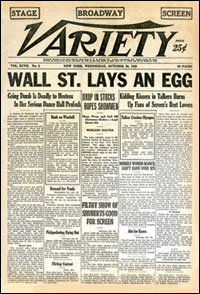Reed Elsevier and Broken Hips
March 25, 2012
Break a hip when you are old and life gets really tough. Publishing companies like Thomson Reuters, Wolters Kluwer, and Reed Elsevier have taken their share of knocks and bumps. Now Reed Elsevier has a broken hip. The woes of scientific, technical, and professional publishers are like a bum ticker. Now a broken hip threatens the life expectancy and possibly the survival of the entity limping like Chester in Gunsmoke.
I am floating in the pond filled with mine drainage in rural Kentucky. It’s a good day as far as Kentucky goes. Even the hunters have taken a day off, so no sounds of gun fire roils the sylvan beauty of an abandoned horse farm. Yep, lots of horse farms for sale. The rich folks can no longer afford the sport of kings. Even kings and princes have had to cut back. What could be more enticing than a non working horse farm?
Oh, I have an idea. A traditional publishing company offering really high value properties like Variety, the must read newspaper of the Hollywood set. Wait. I am incorrect. I get Hollywood news from free Web sites; for example, E!Online, Celebrity Gossip, Entertainment Weekly, Hollywood Reporter, and TMZ.com. Granted a headline like “Ex Kony Soldier Warlord May Have Cursed Jason Russell” is not up to Variety’s headline writing, but it is free, has some exotic varietal images, and, of course, video and ads. Did I mention ads?
I learned about the new attempt to sell Variety in “Daily Variety Up for Sale.” Here’s the passage I noted:
It’s not the first time Reed has sought a buyer for its Hollywood newspaper. In 2008, the company put all of the U.S publications owned by its Reed Business Information unit up for sale. But amid that year’s financial crash, it was unable to find a buyer willing to purchase them all. Since then, the company has sold all of its other publications, including Publisher’s Weekly and Broadcasting & Cable. The move comes as Variety — famous for a show-biz lexicon of industry-specific terms like “boffo” and tongue-twisting headlines like “Sticks Nix Hick Pix” — has lost its standing as Hollywood’s dominant trade newspaper amid heated competition from online-only publications Deadline and the Wrap, as well as its traditional competitor, the Hollywood Reporter.
So now the economy is better and the market for print trade publications is apparently ripe for a sale of the property which “has lost its standing as Hollywood’s dominant trade newspaper” is on the block.
Several questions:
- Why can’t the management of the traditional professional publications find a way to make money from the excellent content these outfits have produced for decades? Content is king I have heard. Well, if so kingly, where’s the value?
- Will traditional publishers like Thomson Reuters, Wolters Kluwer, Reed Elsevier, and their ilk survive once the properties have been sold off? One needs sources of revenue and a nice, fat bank account. Those with bank accounts often give up the game and open pretend businesses like second hard goods stores or a non-profit foundation and hire themselves as managers. One needs a logo to have an identity and faux activities can fill that bill.
- Can a new buyer reinvent Variety-type information services and produce growth and a profit?
The competitors to Variety have responded to a market hunger for Hollywood-type news. I think there is an opportunity. Maybe a new owner with different ways of interpreting market signals can generate money from Hollywood-centric information. I am forming the opinion that when a traditional professional publishing company puts a property on the block, the seller is baffled by the new market dynamics. Innovation, vision, and management are migraine inducing actions. A thrift shop or a Bill Gates type foundation sounds like more fun and may be a heck of a lot less stressful.
Stephen E Arnold, March 25, 2012
Sponsored by Pandia.com



